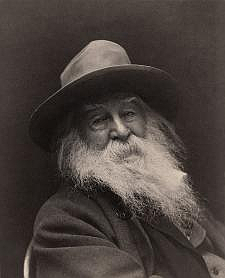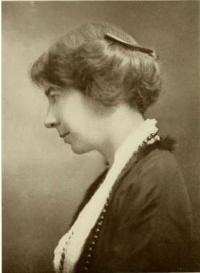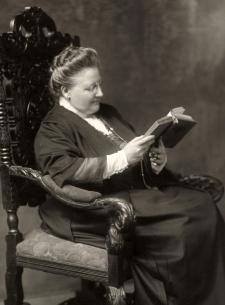Fleurs du Mal Magazine


Or see the index

Sweetest Love, I do Not Go
Sweetest love, I do not go,
For weariness of thee,
Nor in hope the world can show
A fitter love for me;
But since that I
At the last must part, ’tis best,
Thus to use myself in jest
By feigned deaths to die.
Yesternight the sun went hence,
And yet is here to-day;
He hath no desire nor sense,
Nor half so short a way;
Then fear not me,
But believe that I shall make
Speedier journeys, since I take
More wings and spurs than he.
O how feeble is man’s power,
That if good fortune fall,
Cannot add another hour,
Nor a lost hour recall;
But come bad chance,
And we join to it our strength,
And we teach it art and length,
Itself o’er us to advance.
When thou sigh’st, thou sigh’st not wind,
But sigh’st my soul away;
When thou weep’st, unkindly kind,
My life’s blood doth decay.
It cannot be
That thou lovest me as thou say’st,
If in thine my life thou waste,
That art the best of me.
Let not thy divining heart
Forethink me any ill;
Destiny may take thy part,
And may thy fears fulfil.
But think that we
Are but turn’d aside to sleep.
They who one another keep
Alive, ne’er parted be.
John Donne
(1572 – 1631)
Sweetest Love, I do Not Go
• fleursdumal.nl magazine
More in: Archive C-D, Archive C-D, Donne, John

Adieu To a Soldier
Adieu, O soldier!
You of the rude campaigning, (which we shared,)
The rapid march, the life of the camp,
The hot contention of opposing fronts’the long maneuver,
Red battles with their slaughter, ‘the stimulus’the strong, terrific game,
Spell of all brave and manly hearts’the trains of Time through you, and like of you, all fill’d,,
With war, and war’s expression.
Adieu, dear comrade!
Your mission is fulfill’d—but I, more warlike,
Myself, and this contentious soul of mine,
Still on our own campaigning bound,
Through untried roads, with ambushes, opponents lined,
Through many a sharp defeat and many a crisis’often baffled,
Here marching, ever marching on, a war fight out’aye here,
To fiercer, weightier battles give expression.
Walt Whitman
(1819 – 1892)
Poem: Adieu To a Soldier
• fleursdumal.nl magazine
More in: Archive W-X, Archive W-X, Whitman, Walt

Civilization
One moment mankind rides the crested wave,
A moment glorious, beyond recall;
And then the wave, with slow and massive fall,
Obliterates the beauty that it gave.
When discrowned king and manumitted slave
Are free and equal to be slaves of all,
Democracies in their wide freedom brawl,
And go down shouting to a common grave.
So one by one the petals of the rose
Shrivel and fade, and all its splendour goes
Back to the earth; and in her arms embraced
Through wintry centuries the dead seeds sleep
Till spring comes troubling them, and they unleap,
Once more their petals on the world to waste.
Arthur Adams
(1872-1936)
Civilization
(from The Sonnet in Australasia)
• fleursdumal.nl magazine
More in: Adams, Arthur, Archive A-B, Archive A-B

The Maids Of Elfin-Mere
When the spinning-room was here
Came Three Damsels, clothed in white,
With their spindles every night;
One and Two and three fair Maidens,
Spinning to a pulsing cadence,
Singing songs of Elfin-Mere;
Till the eleventh hour was toll’d,
Then departed through the wold.
Years ago, and years ago;
And the tall reeds sigh as the wind doth blow.
Three white Lilies, calm and clear,
And they were loved by every one;
Most of all, the Pastor’s Son,
Listening to their gentle singing,
Felt his heart go from him, clinging
Round these Maids of Elfin-Mere.
Sued each night to make them stay,
Sadden’d when they went away.
Years ago, and years ago;
And the tall reeds sigh as the wind doth blow.
Hands that shook with love and fear
Dared put back the village clock,
Flew the spindle, turn’d the rock,
Flow’d the song with subtle rounding,
Till the false ‘eleven’ was sounding;
Then these Maids of Elfin-Mere
Swiftly, softly, left the room,
Like three doves on snowy plume.
Years ago, and years ago;
And the tall reeds sigh as the wind doth blow.
One that night who wander’d near
Heard lamentings by the shore,
Saw at dawn three stains of gore
In the waters fade and dwindle.
Never more with song and spindle
Saw we Maids of Elfin-Mere,
The Pastor’s Son did pine and die;
Because true love should never lie.
Years ago, and years ago;
And the tall reeds sigh as the wind doth blow.
William Allingham
(1824 – 1889)
The Maids Of Elfin-Mere
• fleursdumal.nl magazine
More in: Allingham, William, Archive A-B, Archive A-B

Sluitertijd zeer kort
Het is met ingehouden adem klaar:
terwijl bij afdrukken aan weerszijden
van de lens zeer kort niets te zien valt
is als de vis van de adelaar de klauwen
ontwaart het water aan beide kanten
nog eventjes glad als een spiegel, eventjes.
Bert Bevers
Sluitertijd zeer kort
uit Bedekte termen, bundel in voorbereiding
Bert Bevers is dichter en schrijver
Hij woont en werkt in Antwerpen (Be)
• fleursdumal.nl magazine
More in: Archive A-B, Archive A-B, Bevers, Bert

Doubt
My soul lives in my body’s house,
And you have both the house and her,
But sometimes she is less your own
Than a wild, gay adventurer;
A restless and an eager wraith,
How can I tell what she will do,
Oh, I am sure of my body’s faith,
But what if my soul broke faith with you?
Sara Teasdale
(1884-1933)
Doubt
• fleursdumal.nl magazine
More in: Archive S-T, Archive S-T, Teasdale, Sara

More in: - Book Lovers, - Book News, - Bookstores, AUDIO, CINEMA, RADIO & TV, Boekenweek

Who is Silvia?
what is she
Who is Silvia? what is she,
That all our swains commend her?
Holy, fair, and wise is she;
The heaven such grace did lend her,
That she might admirèd be.
Is she kind as she is fair?
For beauty lives with kindness.
Love doth to her eyes repair,
To help him of his blindness;
And, being helped, inhabits there.
Then to Silvia let us sing,
That Silvia is excelling;
She excels each mortal thing
Upon the dull earth dwelling;
To her let us garlands bring
William Shakespeare
(1564 – 1616)
Song: “Who is Silvia? what is she”
(from Two Gentlemen of Verona)
• fleursdumal.nl magazine
More in: Archive S-T, Archive S-T, Shakespeare, William

Lead Soldiers
The nursery fire burns brightly, crackling in cheerful
little explosions
and trails of sparks up the back of the chimney. Miniature
rockets
peppering the black bricks with golden stars, as though a gala
flamed a night of victorious wars.
The nodding mandarin on the bookcase moves his
head forward and back, slowly,
and looks into the air with his blue-green eyes. He stares
into the air
and nods — forward and back. The red rose in his hand
is a crimson splash
on his yellow coat. Forward and back, and his blue-green
eyes stare
into the air, and he nods — nods.
Tommy’s soldiers march to battle,
Trumpets flare and snare-drums rattle.
Bayonets flash, and sabres glance —
How the horses snort and prance!
Cannon drawn up in a line
Glitter in the dizzy shine
Of the morning sunlight. Flags
Ripple colours in great jags.
Red blows out, then blue, then green,
Then all three — a weaving sheen
Of prismed patriotism. March
Tommy’s soldiers, stiff and starch,
Boldly stepping to the rattle
Of the drums, they go to battle.
Tommy lies on his stomach on the floor and directs his columns.
He puts his infantry in front, and before them ambles a mounted
band.
Their instruments make a strand of gold before the scarlet-tunicked
soldiers,
and they take very long steps on their little green platforms,
and from the ranks bursts the song of Tommy’s soldiers marching
to battle.
The song jolts a little as the green platforms stick on the thick
carpet.
Tommy wheels his guns round the edge of a box of blocks, and places
a squad of cavalry on the commanding eminence of a footstool.
The fire snaps pleasantly, and the old Chinaman nods — nods. The
fire makes
the red rose in his hand glow and twist. Hist! That
is a bold song
Tommy’s soldiers sing as they march along to battle.
Crack! Rattle! The sparks
fly up the chimney.
Tommy’s army’s off to war —
Not a soldier knows what for.
But he knows about his rifle,
How to shoot it, and a trifle
Of the proper thing to do
When it’s he who is shot through.
Like a cleverly trained flea,
He can follow instantly
Orders, and some quick commands
Really make severe demands
On a mind that’s none too rapid,
Leaden brains tend to the vapid.
But how beautifully dressed
Is this army! How impressed
Tommy is when at his heel
All his baggage wagons wheel
About the patterned carpet, and
Moving up his heavy guns
He sees them glow with diamond suns
Flashing all along each barrel.
And the gold and blue apparel
Of his gunners is a joy.
Tommy is a lucky boy.
Boom! Boom! Ta-ra!
The old mandarin nods under his purple umbrella. The
rose in his hand
shoots its petals up in thin quills of crimson. Then
they collapse
and shrivel like red embers. The fire sizzles.
Tommy is galloping his cavalry, two by two, over the floor. They
must pass
the open terror of the door and gain the enemy encamped under the
wash-stand.
The mounted band is very grand, playing allegro and leading the
infantry on
at the double quick. The tassel of the hearth-rug has
flung down
the bass-drum, and he and his dapple-grey horse lie overtripped,
slipped out of line, with the little lead drumsticks glistening
to the fire’s shine.
The fire burns and crackles, and tickles the tripped
bass-drum
with its sparkles.
The marching army hitches its little green platforms
valiantly, and steadily
approaches the door. The overturned bass-drummer, lying
on the hearth-rug,
melting in the heat, softens and sheds tears. The song
jeers
at his impotence, and flaunts the glory of the martial and still
upstanding,
vaunting the deeds it will do. For are not Tommy’s soldiers
all bright and new?
Tommy’s leaden soldiers we,
Glittering with efficiency.
Not a button’s out of place,
Tons and tons of golden lace
Wind about our officers.
Every manly bosom stirs
At the thought of killing — killing!
Tommy’s dearest wish fulfilling.
We are gaudy, savage, strong,
And our loins so ripe we long
First to kill, then procreate,
Doubling so the laws of Fate.
On their women we have sworn
To graft our sons. And overborne
They’ll rear us younger soldiers, so
Shall our race endure and grow,
Waxing greater in the wombs
Borrowed of them, while damp tombs
Rot their men. O Glorious War!
Goad us with your points, Great Star!
The china mandarin on the bookcase nods slowly, forward and back—
forward and back — and the red rose writhes and wriggles,
thrusting its flaming petals under and over one another like tortured
snakes.
The fire strokes them with its dartles, and purrs at them,
and the old man nods.
Tommy does not hear the song. He only sees the beautiful,
new,
gaily-coloured lead soldiers. They belong to him, and
he is very proud
and happy. He shouts his orders aloud, and gallops his
cavalry past the door
to the wash-stand. He creeps over the floor on his hands
and knees
to one battalion and another, but he sees only the bright colours
of his soldiers and the beautiful precision of their gestures.
He is a lucky boy to have such fine lead soldiers to enjoy.
Tommy catches his toe in the leg of the wash-stand, and jars the
pitcher.
He snatches at it with his hands, but it is too late. The
pitcher falls,
and as it goes, he sees the white water flow over its lip. It
slips
between his fingers and crashes to the floor. But it
is not water which oozes
to the door. The stain is glutinous and dark, a spark
from the firelight
heads it to red. In and out, between the fine, new soldiers,
licking over the carpet, squirms the stream of blood, lapping at
the little green platforms, and flapping itself against the painted
uniforms.
The nodding mandarin moves his head slowly, forward and back.
The rose is broken, and where it fell is black blood. The
old mandarin leers
under his purple umbrella, and nods — forward and back, staring
into the air
with blue-green eyes. Every time his head comes forward
a rosebud pushes
between his lips, rushes into full bloom, and drips to the ground
with a splashing sound. The pool of black blood grows
and grows,
with each dropped rose, and spreads out to join the stream from
the wash-stand. The beautiful army of lead soldiers steps
boldly forward,
but the little green platforms are covered in the rising stream
of blood.
The nursery fire burns brightly and flings fan-bursts of stars up
the chimney,
as though a gala flamed a night of victorious wars.
Amy Lowell
(1874 – 1925)
Lead Soldiers
Poem
• fleursdumal.nl magazine
More in: Archive K-L, Archive K-L, Lowell, Amy

Sporen
Waarlijk liever schuil ik in ons huis, in deze
stad waarin ik gretige namen geef aan al dat
buiten en al die sporen. Men spreekt alsof
een dag te lang duurt in een eigen zegging
terwijl het kompas wijst naar een onverwachte
bedding. Weerbaar haperen klemtonen.
Bert Bevers
Sporen
uit Bedekte termen, bundel in voorbereiding
Bert Bevers is dichter en schrijver
Hij woont en werkt in Antwerpen (Be)
• fleursdumal.nl magazine
More in: Archive A-B, Archive A-B, Bevers, Bert

The Broken Heart
He is stark mad, whoever says,
That he hath been in love an hour,
Yet not that love so soon decays,
But that it can ten in less space devour;
Who will believe me, if I swear
That I have had the plague a year?
Who would not laugh at me, if I should say
I saw a flash of powder burn a day?
Ah, what a trifle is a heart,
If once into love’s hands it come!
All other griefs allow a part
To other griefs, and ask themselves but some;
They come to us, but us love draws;
He swallows us and never chaws;
By him, as by chain’d shot, whole ranks do die;
He is the tyrant pike, our hearts the fry.
If ’twere not so, what did become
Of my heart when I first saw thee?
I brought a heart into the room,
But from the room I carried none with me.
If it had gone to thee, I know
Mine would have taught thine heart to show
More pity unto me ; but Love, alas!
At one first blow did shiver it as glass.
Yet nothing can to nothing fall,
Nor any place be empty quite;
Therefore I think my breast hath all
Those pieces still, though they be not unite;
And now, as broken glasses show
A hundred lesser faces, so
My rags of heart can like, wish, and adore,
But after one such love, can love no more.
John Donne
(1572 – 1631)
The Broken Heart
• fleursdumal.nl magazine
More in: Archive C-D, Archive C-D, Donne, John
A landmark collection of poetry by acclaimed fiction writer, translator, and MacArthur Fellow John Keene, PUNKS: NEW & SELECTED POEMS is a generous treasury in seven sections that spans decades and includes previously unpublished and brand new work.
 With depth and breadth, PUNKS weaves together historic narratives of loss, lust, and love. The many voices that emerge in these poems—from historic Black personalities, both familial and famous, to the poet’s friends and lovers in gay bars and bedrooms—form a cast of characters capable of addressing desire, oppression, AIDS, and grief through sorrowful songs that “we sing as hard as we live.”
With depth and breadth, PUNKS weaves together historic narratives of loss, lust, and love. The many voices that emerge in these poems—from historic Black personalities, both familial and famous, to the poet’s friends and lovers in gay bars and bedrooms—form a cast of characters capable of addressing desire, oppression, AIDS, and grief through sorrowful songs that “we sing as hard as we live.”
At home in countless poetic forms, PUNKS reconfirms John Keene as one of the most important voices in contemporary poetry.
John Keene is a writer, translator, professor, and artist who was named a MacArthur Fellow in 2018. In 1989, Keene joined the Dark Room Writers Collective, and is a Graduate Fellow of the Cave Canem Writers Workshops. He is the author of Annotations, and Counternarratives, both published by New Directions, as well as several other works, including the poetry collection Seismosis, with artist Christopher Stackhouse, and a translation of Brazilian author Hilda Hilst’s novel Letters from a Seducer. Keene is the recipient of many awards and fellowships—including the Windham-Campbell Prize, the Whiting Foundation Prize, the Republic of Consciousness Prize, and the American Book Award. He teaches at Rutgers University-Newark.
# new poetry
Punks: New & Selected Poems
John Keene
Pub Date:12/1/2021
Publisher: The Song Cave
ISBN: 978-1-73727-752-1
Binding: Paperback
Pages:234
Price: $ 20.00
• fleursdumal.nl magazine
More in: # Punk poetry, #Editors Choice Archiv, - Book News, Archive K-L, Archive K-L
Thank you for reading Fleurs du Mal - magazine for art & literature